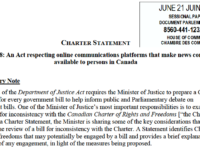Like many Canadians, I spent most of the massive Rogers outage completely offline. With the benefit of hindsight, my family made a big mistake by relying on a single provider for everything: broadband, home phone, cable, and wireless services on a family plan. When everything went down, everything really went down. No dial tone, no channels, no connectivity. Work was challenging and contact with the kids shut off. It was disorienting and a reminder of our reliance on communications networks for virtually every aspect of our daily lives.
So what comes next? We cannot let this become nothing more than a “what did you do” memory alongside some nominal credit from Rogers for the inconvenience. Canada obviously has a competition problem when it comes to communications services resulting in some of the highest wireless and broadband pricing in the developed world. Purchasing more of those services as a backup – whether an extra broadband or cellphone connection – will be unaffordable to most and only exacerbate the problem. Even distributing the services among providers likely means that consumers take a financial hit as they walk away from the benefits from a market that has incentivized bundling discounts. Consumers always pay the price in these circumstances, but there are policy solutions that could reduce the risk of catastrophic outages and our reliance on a single provider for so many essential services.











